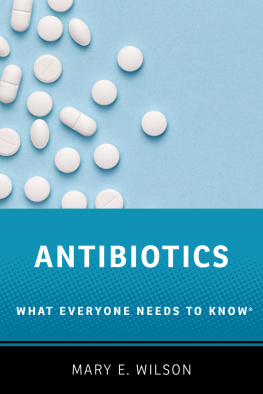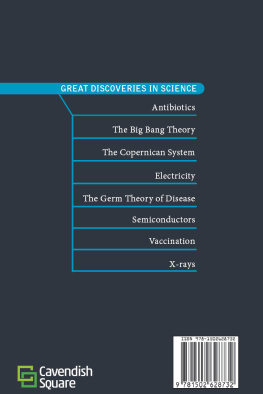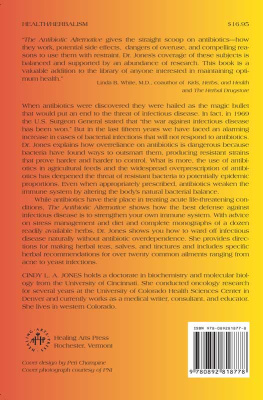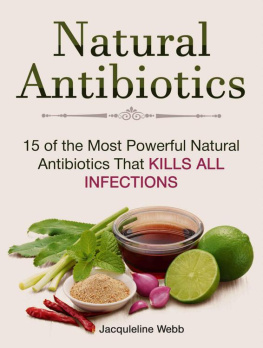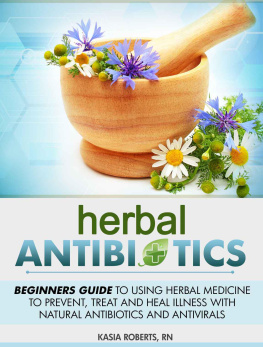ANTIBIOTICS
WHAT EVERYONE NEEDS TO KNOW

Oxford University Press is a department of the University of Oxford. It furthers the Universitys objective of excellence in research, scholarship, and education by publishing worldwide. Oxford is a registered trade mark of Oxford University Press in the UK and certain other countries.
What Everyone Needs to Know is a registered trademark of
Oxford University Press.
Published in the United States of America by Oxford University Press
198 Madison Avenue, New York, NY 10016, United States of America.
Oxford University Press 2019
All rights reserved. No part of this publication may be reproduced, stored in a retrieval system, or transmitted, in any form or by any means, without the prior permission in writing of Oxford University Press, or as expressly permitted by law, by license, or under terms agreed with the appropriate reproduction rights organization. Inquiries concerning reproduction outside the scope of the above should be sent to the Rights Department, Oxford University Press, at the address above.
You must not circulate this work in any other form and you must impose this same condition on any acquirer.
Library of Congress Cataloging-in-Publication Data
Names: Wilson, Mary Elizabeth, author.
Title: Antibiotics : what everyone needs to know / Mary Elizabeth Wilson.
Description: New York, NY : Oxford University Press, [2019] | Series: What
everyone needs to know | Includes bibliographical references and index.
Identifiers: LCCN 2018056947 | ISBN 9780190663407 (paperback : alk. paper) | ISBN 9780190663438 (epub)
ISBN 9780190663414 (hardcover : alk. paper)
Subjects: LCSH: AntibioticsPopular works.
Classification: LCC RM267.W55 2019 | DDC 615.3/29dc23
LC record available at https://lccn.loc.gov/2018056947
To Miriam
Who shares her treasure with me
Contents
The future of humanity and microbes likely will unfold as episodes of a suspense thriller that could be titled Our Wits Versus Their Genes.
Joshua Lederberg, winner of the Nobel Prize for pioneering work on microbial genetics
Antibiotics affect everyone. Most people have taken antibiotics at some point in their lives. But antibiotics can affect even those who have not taken them.
Antibiotics are fundamentally different from other drugs. Antibiotics are a shared resource, a community property. Using them can promote the appearance and sometimes the predominance of bacteria that resist their action. They affect the microbial landscape and biological systems on Earth. They do not disappear when a person takes a dose of penicillin or another antibiotic. Use of antibiotics has had a profound global impact.
A century ago you could die from a cut on your finger. If the break in the skin allowed virulent bacteria, like Streptococcus, to enter the body, they could multiply and spread. No available treatment could halt the spread, and a person lived or died depending on whether his or her own immune system could contain the infection. The youngest and the oldest, the most vulnerable, regularly died from what we would consider common infectionsbut young, healthy individuals also died from serious bacterial infections, like Staphylococcus and Streptococcus. Women could die from childbirth if disease-causing bacteria entered tissues after they gave birth. Minor injuries or surgical procedures or appendicitis could end in death. Pneumonia, the old mans friend, often ended in death. During wars and other conflicts, up until World War I, more died from infections than directly from weapons of war.
Bacteria are everywherein and on us and animals, in air, in the soil, in water, and in the environment. We live in a sea of microbes. Only a tiny fraction can cause us harm, and many are essential for life as we know itfor each of us personally and for the planet. They are abundant, genetically diverse, resilient, and able to change rapidly. Bacteria make up a large part of life on Earth. We rely on our resident bacteria to help shape our immune systems, to help process our food, to fend off invading bacteria, and for myriad functions that we are just beginning to understand.
Bacteria can also kill us, and antibiotics have saved millions of lives over the decades they have been available. They are currently the best form of treatment for many common and not-so-common infections. They are powerful and potent and can seem magical in their rapid reversal of many infections. They can pull patients back from the brink of death. There is good reason antibiotics were considered miracle drugs when they first became available.
Antibiotics produce immediate as well as long-term consequences. Because of the incredible capacity of microbes to change rapidly through mutation and through horizontal gene transfer and a whole variety of molecular maneuvers, they can evade the effects of antibiotics and facilitate movement of resistance to other bacterianot necessarily even the same species of bacteria. Exposure to antibiotics (and to antiseptics, disinfectants, and other biocides) thus contributes to the emergence of resistance in bacteria. The wide use of antibiotics has helped shape a microbial world that is composed of many more resistant bacteria than existed before antibiotics were used.
Because antibiotics are relatively cheap, accessible, familiar, and generally safe, they are often used casually, indiscriminately, and thoughtlessly. Antibiotics are used to treat humans, but large quantities are also used in food animals, work animals, pets, and plants. Widespread use of antibiotics ultimately reduces their effectiveness for everyone. This leads to a major challenge: how do we apply these life-saving drugs in ways to save lives and also preserve, for as long as possible, their benefits? Too often we are squandering a precious resource.
Many global organizations, governments, and institutions are awakening to the serious problem of antibiotic resistance and are trying to find ways to reverse this growing menace. This will not be easy. The effort must be global because antibiotic-resistant bacteria and resistance genes move within regions and around the world with the greatest of ease. They are carried by humans, by animals, in food, and in water systems. They contaminate the soil and water in some areas.
Interventions to deal with antibiotic resistance must involve multiple sectorshuman and animal health, agriculture, environmental systems, food production, industry, governments, and policymakers. A One Health approach must embrace animal and plant health and the environment as well human health. Urgent needs include provision of infrastructure to provide clean water and sanitary waste disposal to populations that lack them, delivery of effective vaccines, and research into diagnostics, new vaccines, and new antibiotics and other treatment approaches. Stewardship programs can help to improve use and perhaps allow longer use of existing antibiotics, but stewardship alone will not be sufficient. We also need to reduce the incidence of avoidable infections to reduce the need for antibiotics. Three prominent areas include improved access to clean water and sanitary waste disposal, increased use of current vaccines, and interventions to reduce health careassociated infections.
The World Health Organization (WHO) recently (2018) delivered a report that lays out total consumption of antibiotics as described by defined daily doses (DDDs) per 1,000 inhabitants per day in metric tons for 65 countries and areas. The consumption ranges from 4.4 DDDs per 1,000 inhabitants in Burundi to 64.4 DDDs for Mongolia. Even within high- and middle-income countries, use in 2015 varied widely: 9.78 in the Netherlands, 11.49 in Germany, 14.19 in Japan, 17.05 in Canada, 25.92 in France, and 33.85 for Greece. There is also wide variation in antibiotic use by city and region within countries, including the United States. The marked, national variation in use suggests that many countries could achieve good outcomes with substantially reduced consumption of antibiotics.

